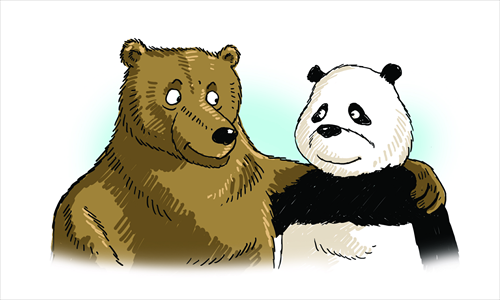Xi's visit set to usher Sino-Russian friendship into a brand-new era

Editor's Note:
As the new president of China, Xi Jinping is expected to visit Russia Friday for his first foreign tour. His predecessor, Hu Jingtao, also picked Russia as his first foreign destination in 2003. While many embrace Xi's visit, some Russian media is also expressing concerns about China's rise. How were Sino-Russian ties in the last decade? How should China remove Russia's worries about the rise of China? Two Chinese experts shared their view with the Global Times.
Great steps forward
Jiang Yi, deputy director of Russian studies at the Chinese Academy of Social Sciences
Maintaining a steady and sound relationship with Russia has been a fine Chinese tradition since president Jiang Zemin took office in 1993.
The Treaty of Good-Neighborliness and Friendly Cooperation Between the People's Republic of China and the Russian Federation was signed by Jiang and Vladimir Putin in 2001. Hu's visit to Russia in 2003 could be seen as the beginning of Sino-Russian cooperation.
I think the last decade has witnessed a giant step forward in Sino-Russian ties. Currently, China is the largest trading partner of Russia. And the total trade volume between two countries could reach $200 billion by 2020.
China and Russia have negotiated the settlement of long-standing territorial disputes, such as the Heixiazi Island dispute.
Admittedly, there are some problems between China and Russia, but these are a natural outshoot of the development of both countries.
China's rapid growth embarrasses its neighbor. China's development does benefit Russia. But on the other hand, Chinese immigration is seen as a threat to the future of Russia's Far East region.
It is hard to remove Russian worries overnight. And we still need to make an effort to gradually ease Russia's fears.
Due to common interests on various international issues, such as Syria and North Korea, cooperation is the mainstream of interaction.
The scope of Sino-Russian trade should be gradually expanded.
In addition, the quality and structure of bilateral trade also needs to be improved if the two countries are to have the promising trade future that both desire.
Limited progress
Zhu Feng, professor at the School of International Studies of Peking University
In my opinion, Xi's visit can be considered an attempt to restart the relationship between these two nations.
Russia's strategic significance in China's diplomacy could be given full weight by Xi's visit. There is no doubt that China attaches great importance to its interaction and cooperation with Russia.
However, compared with Hu's visit to Russia in 2003, Sino-Russian ties haven't made much progress during last decade.
In 2003, confronted with the outbreak of the Iraq war, China and Russia joined together to object to US military action. That was the golden age of the relationship between Beijing and Moscow. In contrast, in the Diaoyu Islands dispute in 2012, Russia remained neutral.
The trade volume between China and Russia reached $88 billion in 2012. This may be impressive, but the trade volume for 2012 between China and the US is approaching $500 billion. Sino-Russian trade has been restricted by the differences in bilateral economic structure.
And when they set the direction of their foreign policies, both China and Russia are chiefly fixated on the US, not on each other
Despite their long-running strategic partnership, China has not received enough attention from Russia.
The proposed project to build a pipeline from Angarsk in Russia to Daqing in Northeast China has seen constant delays. The Shanghai Cooperation Organization, led by China, has also not been given enough attention by Russia either.
On the other side, Moscow has accused Beijing of violating the patents of Russian-made weapons, saying that China was simply copying Russian technologies and competing with Russia on the international arms market.
Russia launched a large-scale military offensive against Georgia in South Ossetia in 2008, sparking protests from China due to the collision with the Beijing Olympic Games.
Both China and Russia need to rethink their own foreign policies. Bilateral ties are based on more transparent negotiations.